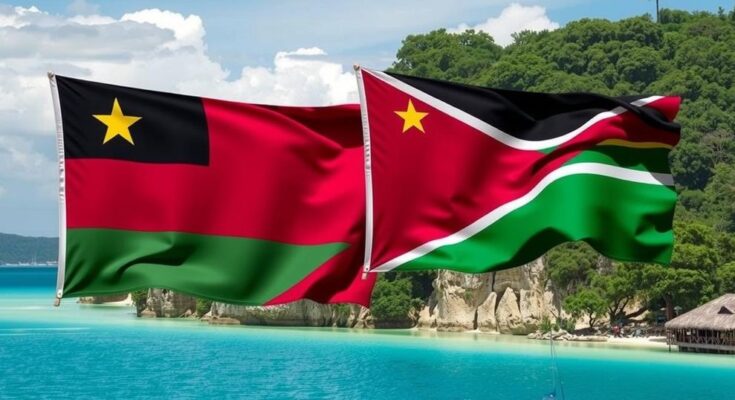Malawi and Tanzania are embroiled in a territorial dispute over Lake Malawi, stemming from differing interpretations of historical treaties and international laws. Malawi claims ownership based on the Anglo-German Treaty of 1890, while Tanzania argues for a median line approach. The dispute impacts millions who depend on the lake, which also holds potential oil and gas reserves. Diplomatic efforts for resolution have yet to yield results, highlighting the complexities of reconciling historical agreements with modern practices.
The ongoing territorial dispute between Malawi and Tanzania concerning Lake Malawi, referred to as Lake Nyasa by Tanzania, remains unresolved and continues to heighten tensions between the two countries. Central to this conflict are the contrasting interpretations of historical treaties and international laws regarding ownership of the lake.
Malawi claims sovereign rights over the entire lake, asserting that its boundary extends to the Tanzanian shore based on the Anglo-German Treaty of 1890. This treaty, also known as the Heligoland-Zanzibar Treaty, is viewed by Malawi as establishing the eastern shoreline as the boundary, diverging from the traditional median line used in international boundary agreements. Malawi fortifies its position by citing prior arrangements with Portuguese colonial authorities, wherein sovereignty over specific islands was ceded to reinforce its claims over Lake Malawi.
Conversely, Tanzania contests Malawi’s claims by arguing that international norms favor a median line approach in delineating boundaries across shared bodies of water. Tanzania insists that the boundary should be established in a manner parallel to the southern border with Mozambique, where the median line principle is applied, thus proposing a fair distribution of resources between the two nations.
The ramifications of this dispute are significant, affecting the livelihoods of millions reliant on Lake Malawi for water and sustenance while also involving the potential discovery of extensive oil and gas reserves. As both nations strive for control over these resources, the stakes continue to rise.
Despite ongoing diplomatic efforts, including attempts at mediation by the African Union and other international entities, a resolution remains elusive. Malawi steadfastly underscores the legitimacy of the 1890 treaty, while Tanzania advocates for an interpretation of boundary law that reflects modern practices. This protracted disagreement serves to illustrate the complexities of reconciling historical treaties with contemporary standards in international law, leaving the status of Lake Malawi a pressing matter of national interest.
The dispute over Lake Malawi is rooted in historical treaties dating back to the colonial era, specifically the Anglo-German Treaty of 1890. This treaty has been the focal point of Malawi’s claim to the lake, which it believes grants ownership up to the Tanzanian shore. In contrast, Tanzania maintains that modern international norms prioritize a median line approach for determining boundaries in shared water bodies. This contention reflects broader issues involving resource management and regional cooperation. As both nations seek to utilize the lake’s resources, which are vital for the economy and sustenance, the political and economic implications of this dispute become increasingly pronounced.
In conclusion, the territorial contention between Malawi and Tanzania over Lake Malawi epitomizes the challenges of historical boundary claims in the context of current international law and norms. Malawi’s reliance on the 1890 treaty and Tanzania’s advocacy for modern interpretations underscore the complexity of resolving the dispute. As both nations vie for control over the lake’s resources, the implications for regional stability and cooperation remain critical. Continued diplomatic efforts are essential to address this ongoing issue and find an equitable solution.
Original Source: malawi24.com




